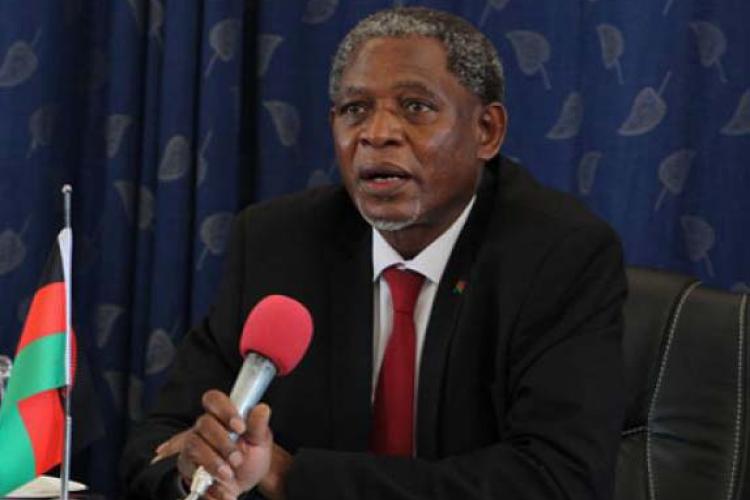Ministry of Justice Hon. Titus Mvalo has today clarified the mandate of his ministry in the 50th Session of Parliament, 3rd meeting in Lilongwe, explaining the different constitutional roles the ministry and the Judiciary play.
The minister told the Speaker that he was honoured to stand before the House to give a statement on the growing misunderstanding of the mandates of the Ministry of Justice and the Judiciary.
"As Honourable Members, may wish to recall, the Government has three arms; The Executive, The Legislature and The Judiciary, as created by the Constitution. It is worth pointing out that these three arms of Government are independent of but complimentary to each other.
"This is what is referred to as the principle of separation of powers. Madam Speaker, the principle of separation of powers is the bedrock of any democratic society. Each of the above cited arms of Government has a crucial and separate role to play," the minister said.
Mvalo explained that the Executive is responsible for the initiation of policies and legislation as well as implementation and enforcement of policies, laws and values expressed or implied in the Constitution of Malawi, section 7.
The Executive, he explained, comprises of The President, The Vice President, Cabinet Ministers and Deputy Ministers as provided under section 92 of the Constitution.
"The ministers are responsible to the President for the administration of their own ministries, departments, and agencies, section 97 of the Constitution.
"The Minister of Justice is the political and policy head of the ministry, and his duty is to promote the rule of law, justice and democracy, transparency and accountability. He is not a technocrat or an operative, and so he is not involved in, for example, prosecution of cases or in dealing with what is in the courts," he explained.
The roles of the Ministry of Justice include providing legal advice and services to the Government’s ministries, departments and agencies, including representing the government in civil litigation through the office of the Attorney General, prosecution of criminal matters through the office of the Director of Public Prosecutions (DPP), preparing and drafting legislation, contract agreements, vetting contracts and other legal instruments on behalf of the government, according to Mvalo.
He further told the House that the Ministry of Justice is also responsible for carrying out various registrations and administering deceased estates.
The minister explained the Ministry of Justice consists of the following departments; The Attorney General’s office, and the Attorney General is the principal legal advisor to the Government.
"The office of the Attorney General represents Government in all Civil suits against the Government, and its departments in all Courts of Malawi and beyond.
Directorate of Public Prosecutions, the minister told Parliament, is headed by the Director of Public Prosecutions. He said the DPP has among others, powers to prosecute criminal cases, undertake criminal proceedings against persons before any court, undertake and continue criminal proceedings by any other person or authority as prescribed under Section 99 of the Constitution of Malawi.
Department of Administrator General, he told the House, is responsible for administration of Deceased estates and trusts.
"Department of Registrar General is responsible for registration and administration of business entities, non-profit organizations and industrial property rights. It is also responsible for the assessment and collection of non-tax revenue such as stamp duties.
"Other independent institutions for which Ministry of Justice is the Line Ministry and for which the Minister of Justice speaks in Parliament for are:
• Anti-Corruption Bureau
• Law Commission
• Human Rights Commission
• Electoral Commission and
• Legal Aid Bureau
He explained that the Ministry of Justice and its minister do not have arresting powers, so the Minister of Justice does not and cannot arrest people.
"It is not within the functions of Ministry of Justice to arrest, not even to investigate cases. The function and powers of arrest lie with Law enforcement agencies, namely, the Police, Anti-Corruption Bureau, Malawi Revenue Authority, Reserve Bank of Malawi and Financial Intelligence Authority but by and large all these rely on the Police for the actual effecting of arrest.
"The Minister of Justice has no role in all this, not even in ordering an arrest because he has no power to do so. The Police who are the ones who arrest, do so either on their own for crimes committed in their face or presence or after receiving a report or complaint.
"Every person has the right, and civic duty to report a crime. The Police investigate allegations of crime committed, and based on their findings form an independent judgment of whether to arrest or not," Mvalo explained.
The Judiciary, the minister went further, is an independent arm of the Government separate from the Executive branch where Ministry of Justice is.
"This arm of Government is headed by the Chief Justice who is also a Justice of Appeal in the Supreme Court.
"The Judiciary is independent from the other two arms of Government. Thus, the Executive branch and the Legislature cannot interfere with the Judiciary in respect of how matters or cases are disposed of. It is the duty of the Judiciary itself to ensure that their constitutional mandate is undertaken in a manner that serves the interest of the people of Malawi...
"Madam Speaker, let there be no confusion in the separation of powers because of the role of the Minister of Justice in speaking for the Judiciary in the National Assembly. The Minister represents the Judiciary only at policy level as holder of the Justice Policy, and he speaks for the Judiciary in the National Assembly only because the Judiciary cannot speak for itself there but he has no place in the hierarchy of the Judiciary and he has no power to interfere with, or influence the processes or operations of the court or with the discharge of duties of the courts," the minister said.
- 125 views

